Migrating Web Servers to IaaS in AWS: Benefits, Architecture, and Challenges
VerifiedAdded on 2023/01/11
|17
|1348
|35
Presentation
AI Summary
This presentation discusses the migration of web servers to IaaS in AWS by DTGOV. It covers the impact on users, the required cloud architecture, and the replication or replacement of the current infrastructure. It also explores the benefits and challenges of moving to Office 365, the differences between IaaS, PaaS, and SaaS models, and the most appropriate model for SharePoint service. The presentation concludes with a discussion on the problems DTGOV may encounter and the methods of dealing with them.
Contribute Materials
Your contribution can guide someone’s learning journey. Share your
documents today.
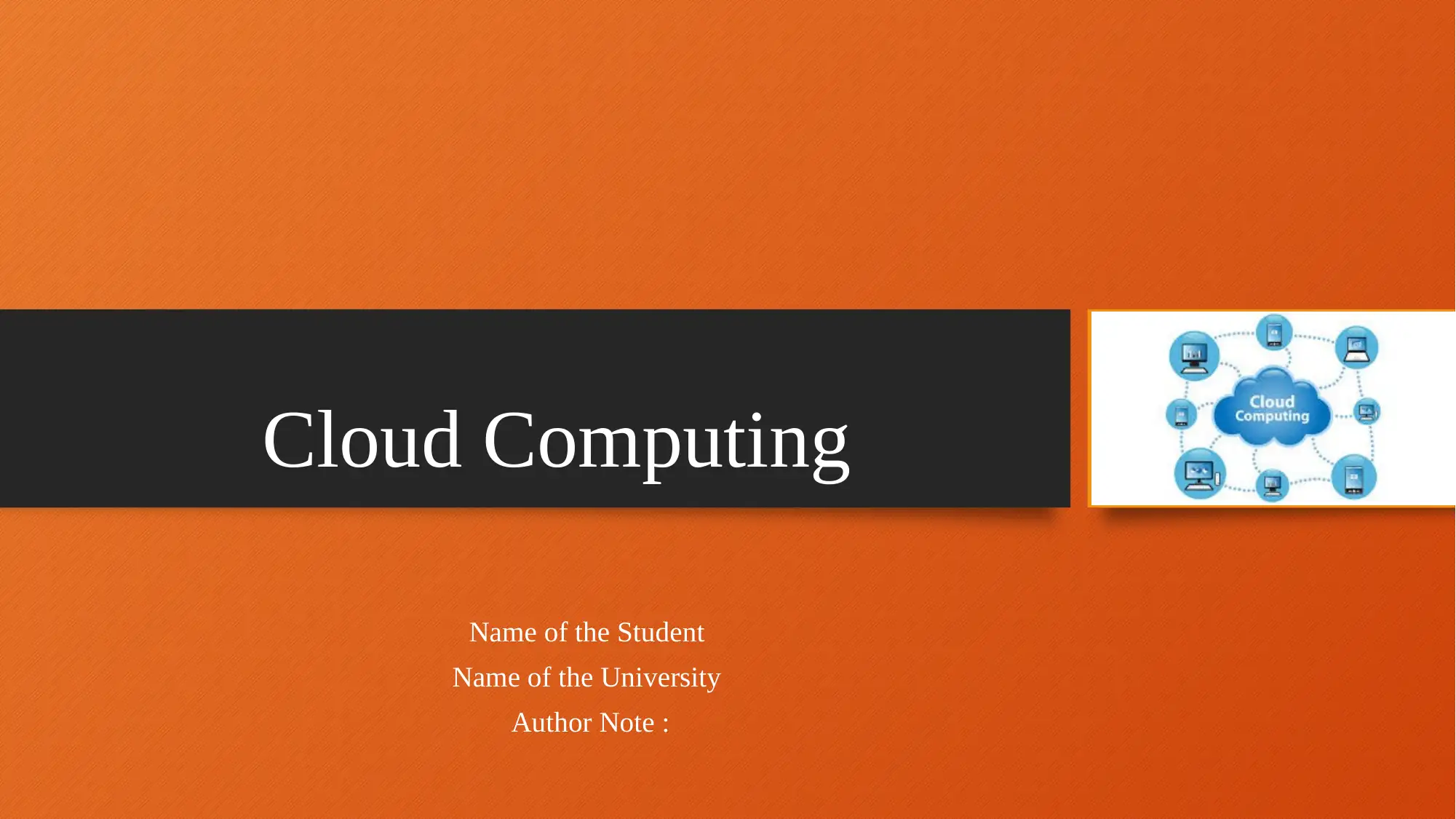
Cloud Computing
Name of the Student
Name of the University
Author Note :
Name of the Student
Name of the University
Author Note :
Secure Best Marks with AI Grader
Need help grading? Try our AI Grader for instant feedback on your assignments.
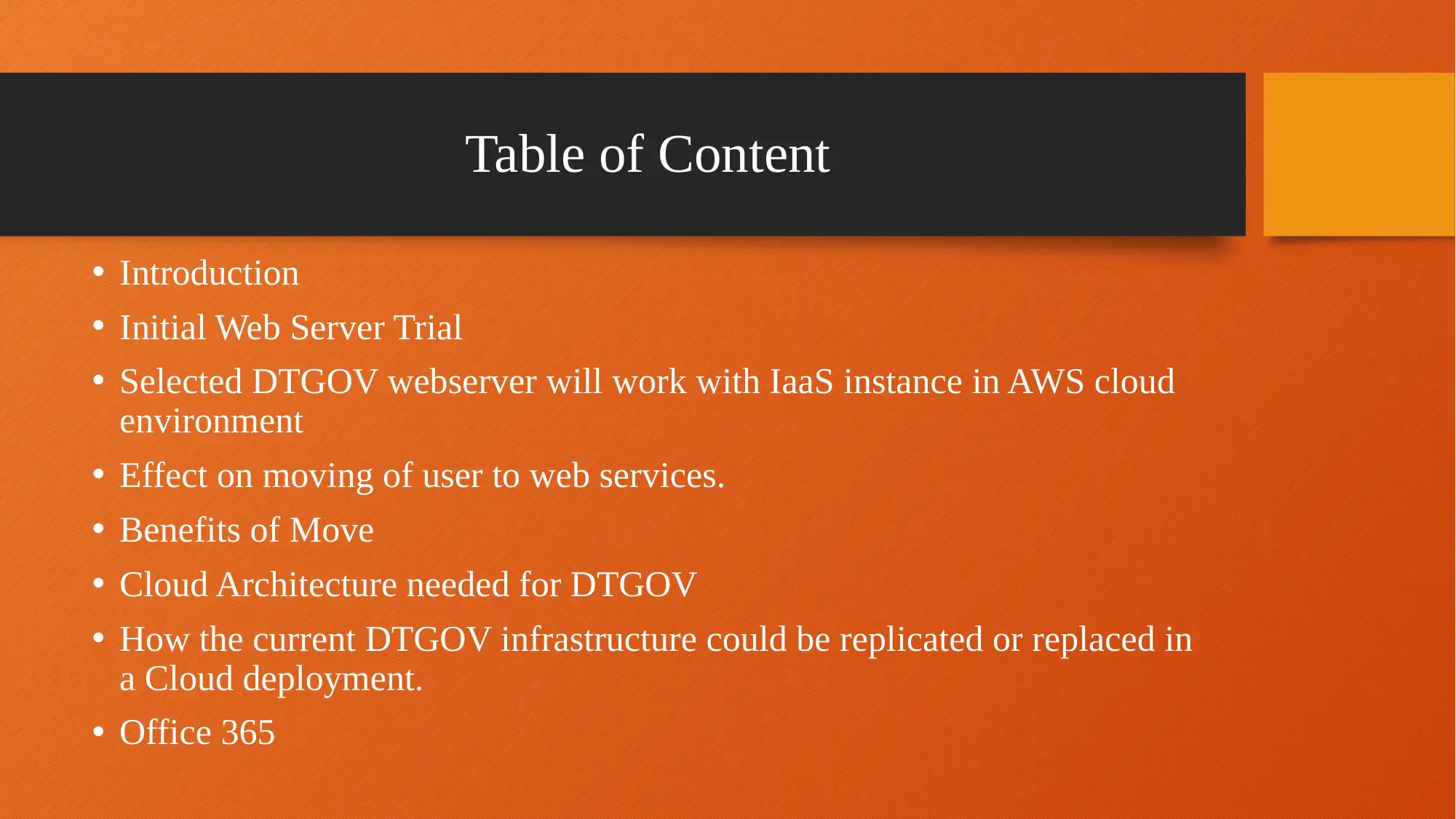
Table of Content
• Introduction
• Initial Web Server Trial
• Selected DTGOV webserver will work with IaaS instance in AWS cloud
environment
• Effect on moving of user to web services.
• Benefits of Move
• Cloud Architecture needed for DTGOV
• How the current DTGOV infrastructure could be replicated or replaced in
a Cloud deployment.
• Office 365
• Introduction
• Initial Web Server Trial
• Selected DTGOV webserver will work with IaaS instance in AWS cloud
environment
• Effect on moving of user to web services.
• Benefits of Move
• Cloud Architecture needed for DTGOV
• How the current DTGOV infrastructure could be replicated or replaced in
a Cloud deployment.
• Office 365
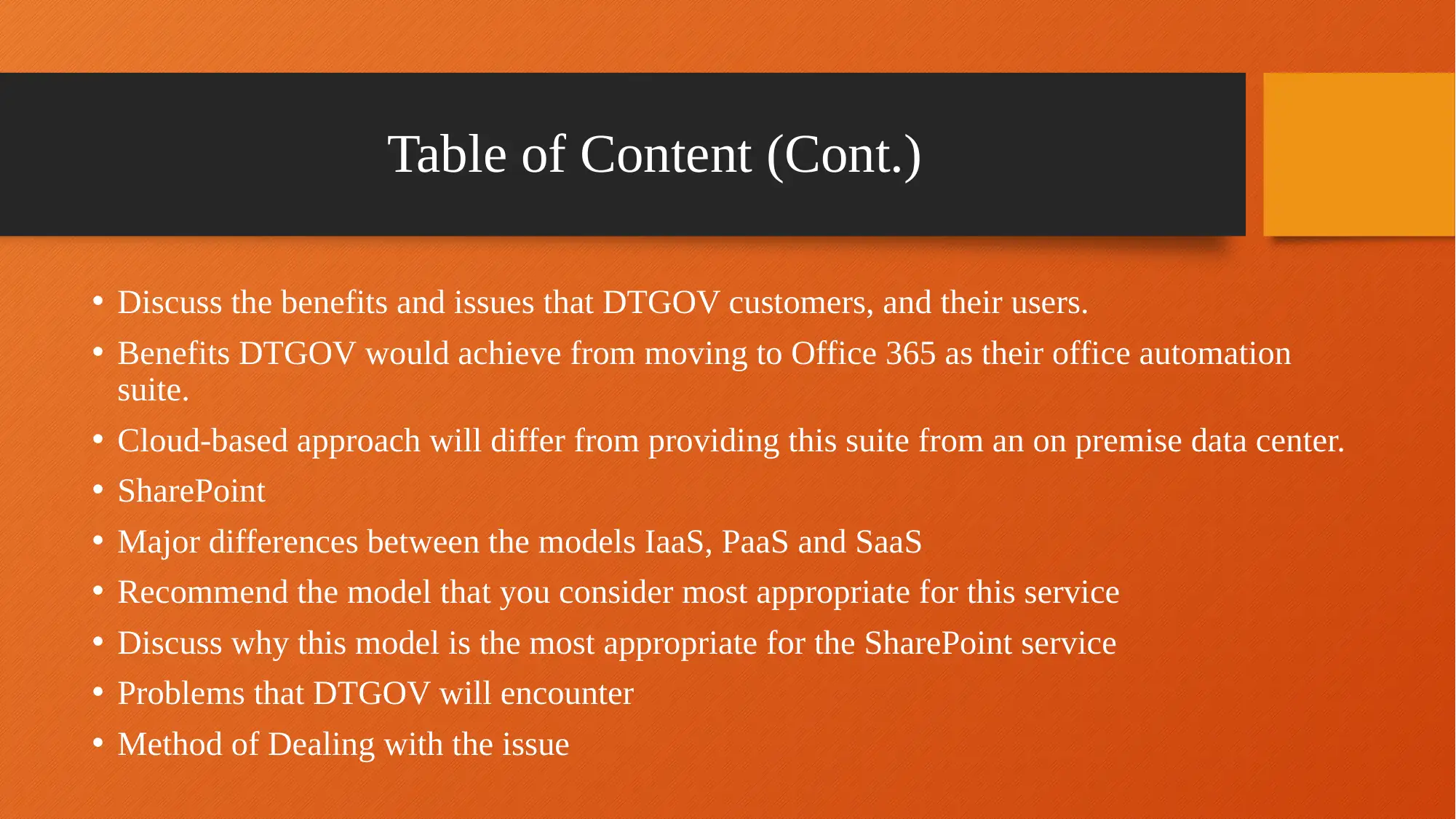
Table of Content (Cont.)
• Discuss the benefits and issues that DTGOV customers, and their users.
• Benefits DTGOV would achieve from moving to Office 365 as their office automation
suite.
• Cloud-based approach will differ from providing this suite from an on premise data center.
• SharePoint
• Major differences between the models IaaS, PaaS and SaaS
• Recommend the model that you consider most appropriate for this service
• Discuss why this model is the most appropriate for the SharePoint service
• Problems that DTGOV will encounter
• Method of Dealing with the issue
• Discuss the benefits and issues that DTGOV customers, and their users.
• Benefits DTGOV would achieve from moving to Office 365 as their office automation
suite.
• Cloud-based approach will differ from providing this suite from an on premise data center.
• SharePoint
• Major differences between the models IaaS, PaaS and SaaS
• Recommend the model that you consider most appropriate for this service
• Discuss why this model is the most appropriate for the SharePoint service
• Problems that DTGOV will encounter
• Method of Dealing with the issue
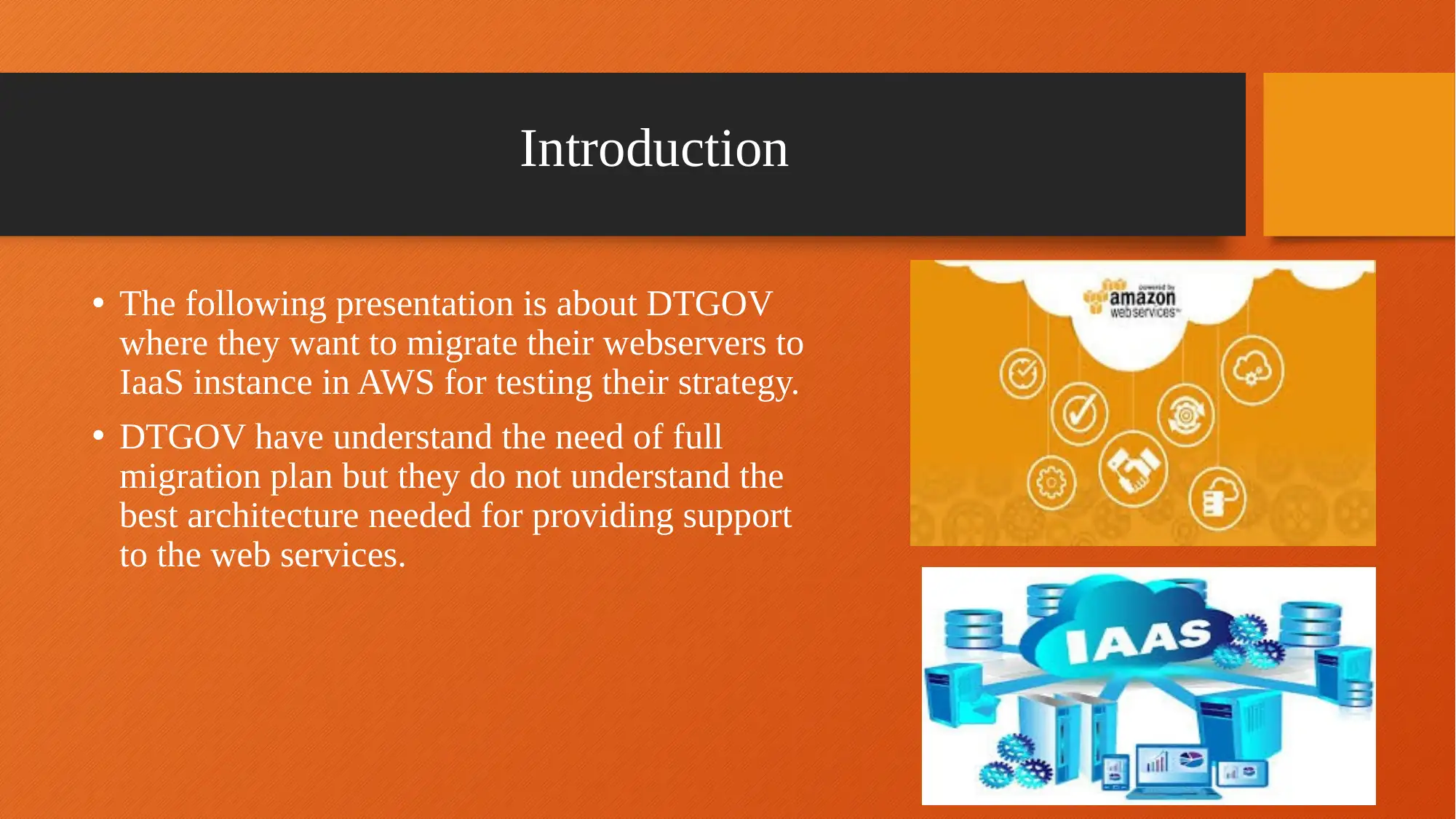
Introduction
• The following presentation is about DTGOV
where they want to migrate their webservers to
IaaS instance in AWS for testing their strategy.
• DTGOV have understand the need of full
migration plan but they do not understand the
best architecture needed for providing support
to the web services.
• The following presentation is about DTGOV
where they want to migrate their webservers to
IaaS instance in AWS for testing their strategy.
• DTGOV have understand the need of full
migration plan but they do not understand the
best architecture needed for providing support
to the web services.
Secure Best Marks with AI Grader
Need help grading? Try our AI Grader for instant feedback on your assignments.
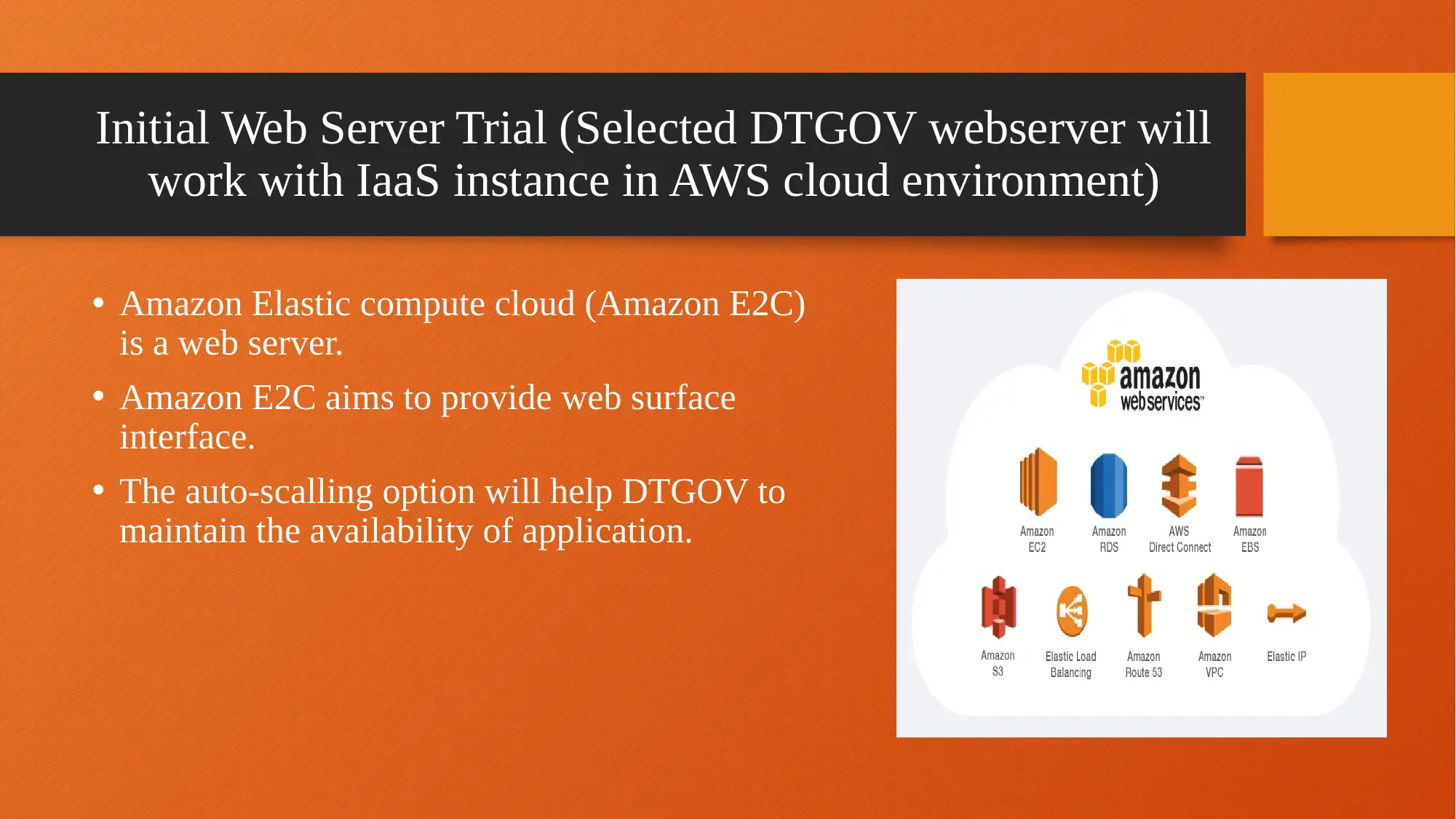
Initial Web Server Trial (Selected DTGOV webserver will
work with IaaS instance in AWS cloud environment)
• Amazon Elastic compute cloud (Amazon E2C)
is a web server.
• Amazon E2C aims to provide web surface
interface.
• The auto-scalling option will help DTGOV to
maintain the availability of application.
work with IaaS instance in AWS cloud environment)
• Amazon Elastic compute cloud (Amazon E2C)
is a web server.
• Amazon E2C aims to provide web surface
interface.
• The auto-scalling option will help DTGOV to
maintain the availability of application.
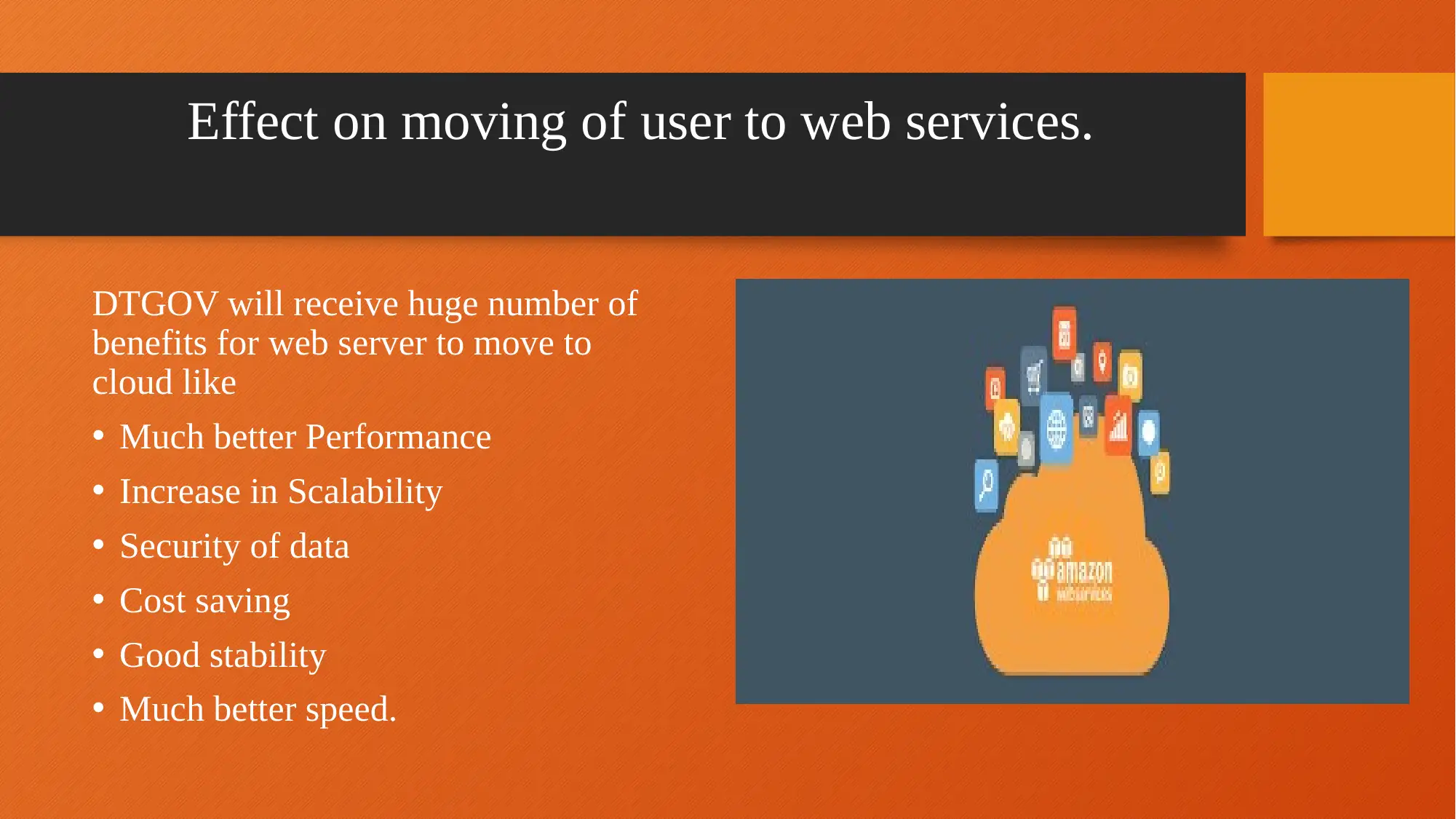
Effect on moving of user to web services.
DTGOV will receive huge number of
benefits for web server to move to
cloud like
• Much better Performance
• Increase in Scalability
• Security of data
• Cost saving
• Good stability
• Much better speed.
DTGOV will receive huge number of
benefits for web server to move to
cloud like
• Much better Performance
• Increase in Scalability
• Security of data
• Cost saving
• Good stability
• Much better speed.
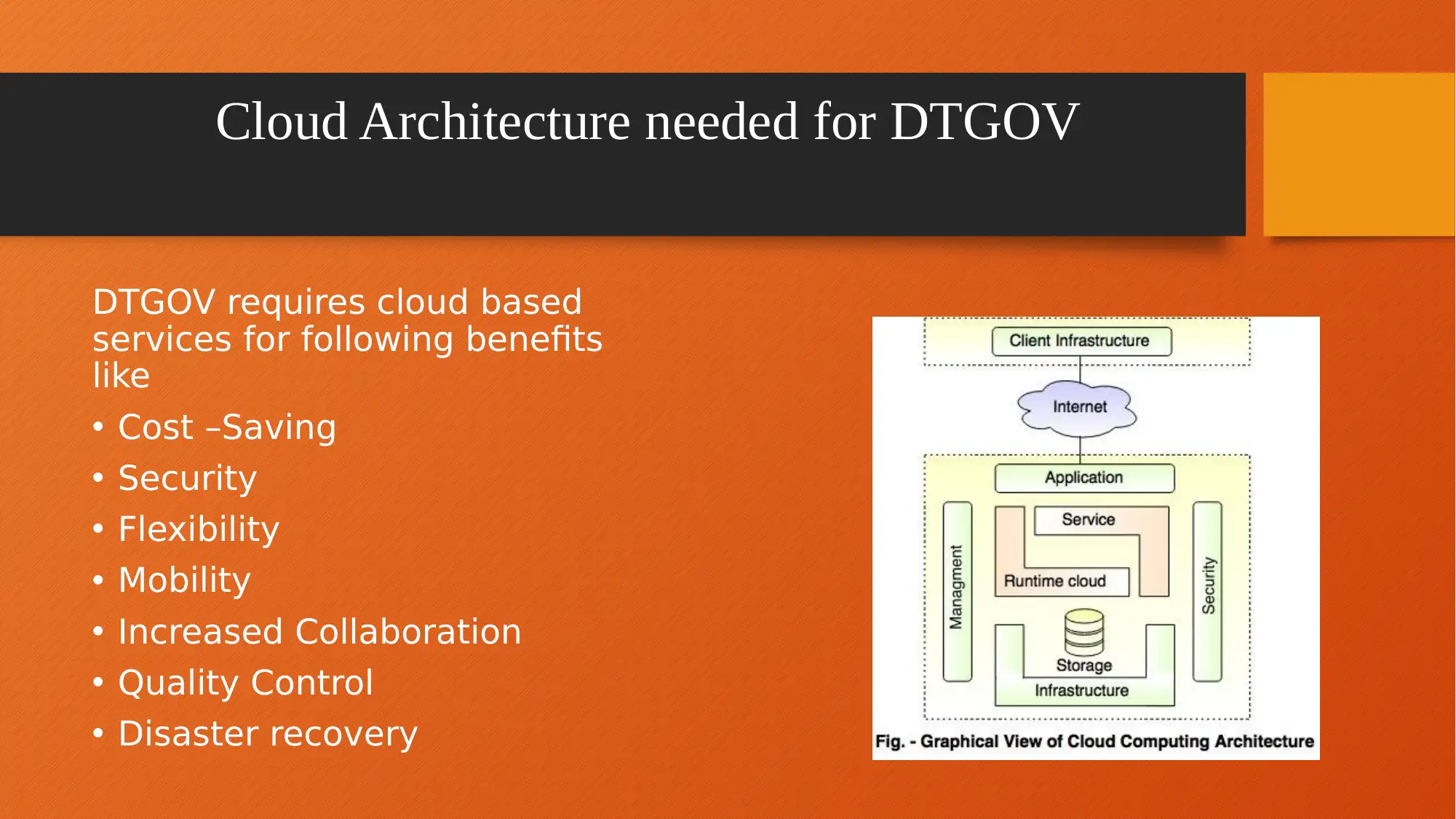
Cloud Architecture needed for DTGOV
DTGOV requires cloud based
services for following benefits
like
• Cost –Saving
• Security
• Flexibility
• Mobility
• Increased Collaboration
• Quality Control
• Disaster recovery
DTGOV requires cloud based
services for following benefits
like
• Cost –Saving
• Security
• Flexibility
• Mobility
• Increased Collaboration
• Quality Control
• Disaster recovery
Paraphrase This Document
Need a fresh take? Get an instant paraphrase of this document with our AI Paraphraser
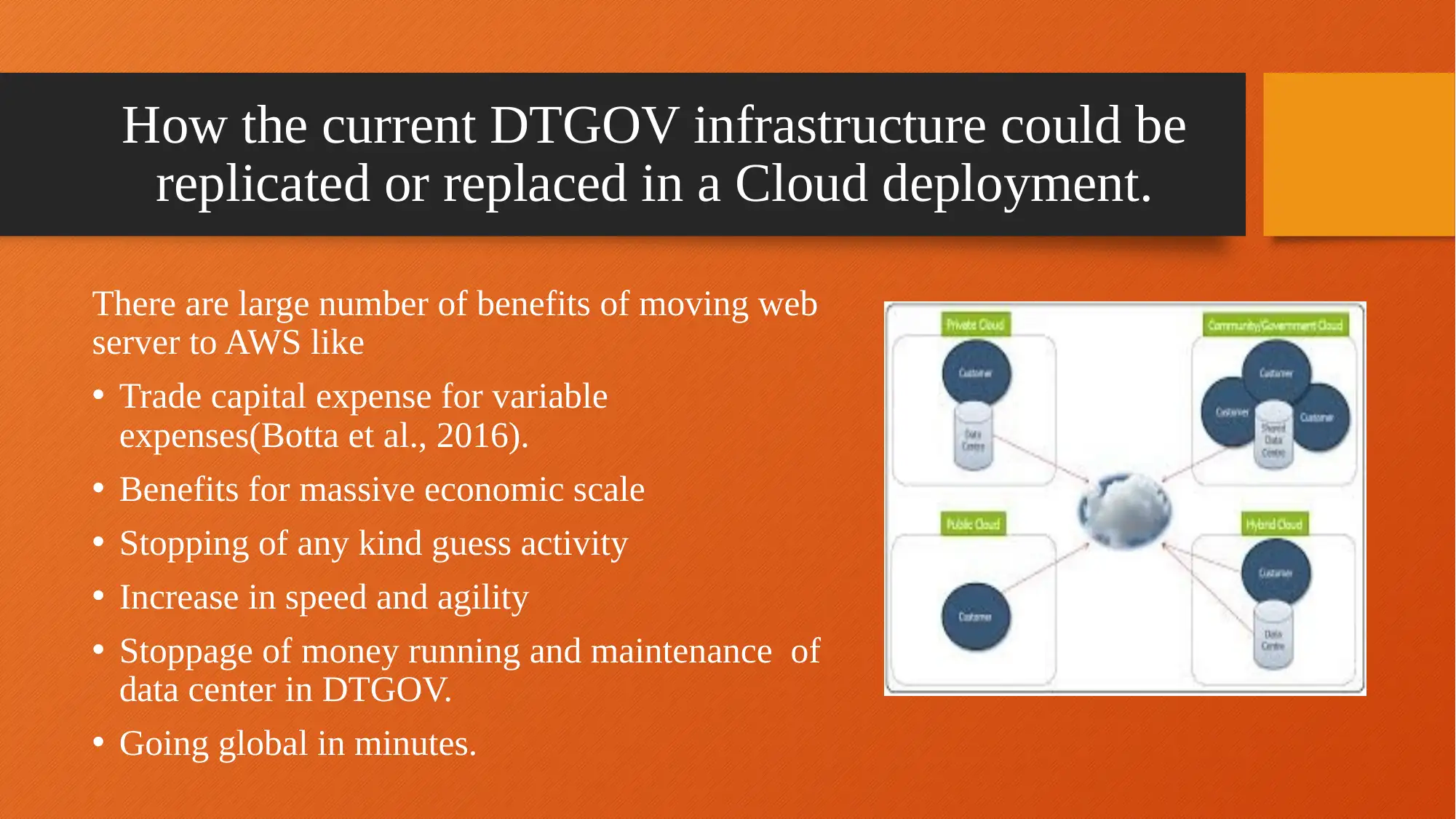
How the current DTGOV infrastructure could be
replicated or replaced in a Cloud deployment.
There are large number of benefits of moving web
server to AWS like
• Trade capital expense for variable
expenses(Botta et al., 2016).
• Benefits for massive economic scale
• Stopping of any kind guess activity
• Increase in speed and agility
• Stoppage of money running and maintenance of
data center in DTGOV.
• Going global in minutes.
replicated or replaced in a Cloud deployment.
There are large number of benefits of moving web
server to AWS like
• Trade capital expense for variable
expenses(Botta et al., 2016).
• Benefits for massive economic scale
• Stopping of any kind guess activity
• Increase in speed and agility
• Stoppage of money running and maintenance of
data center in DTGOV.
• Going global in minutes.
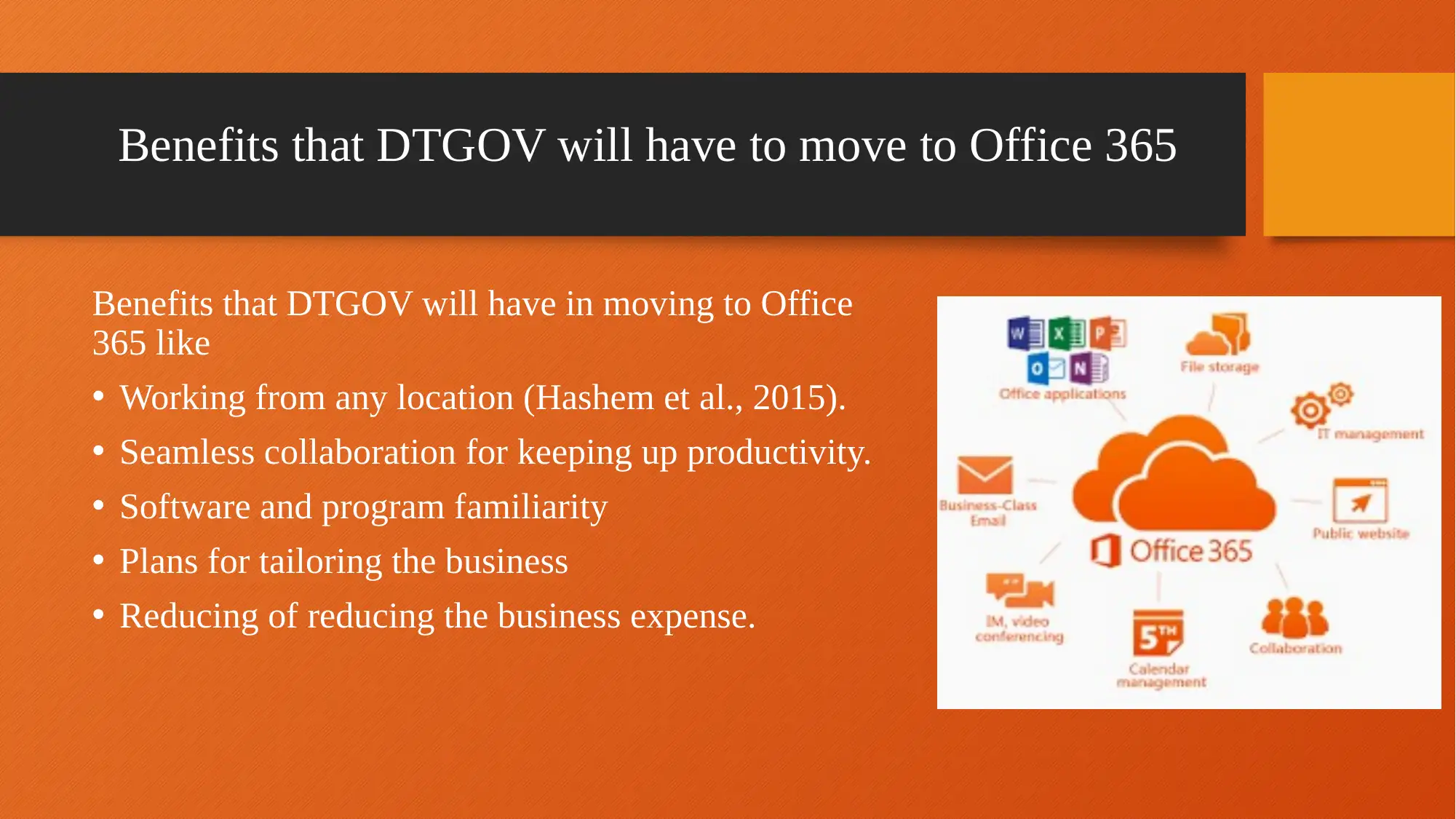
Benefits that DTGOV will have to move to Office 365
Benefits that DTGOV will have in moving to Office
365 like
• Working from any location (Hashem et al., 2015).
• Seamless collaboration for keeping up productivity.
• Software and program familiarity
• Plans for tailoring the business
• Reducing of reducing the business expense.
Benefits that DTGOV will have in moving to Office
365 like
• Working from any location (Hashem et al., 2015).
• Seamless collaboration for keeping up productivity.
• Software and program familiarity
• Plans for tailoring the business
• Reducing of reducing the business expense.
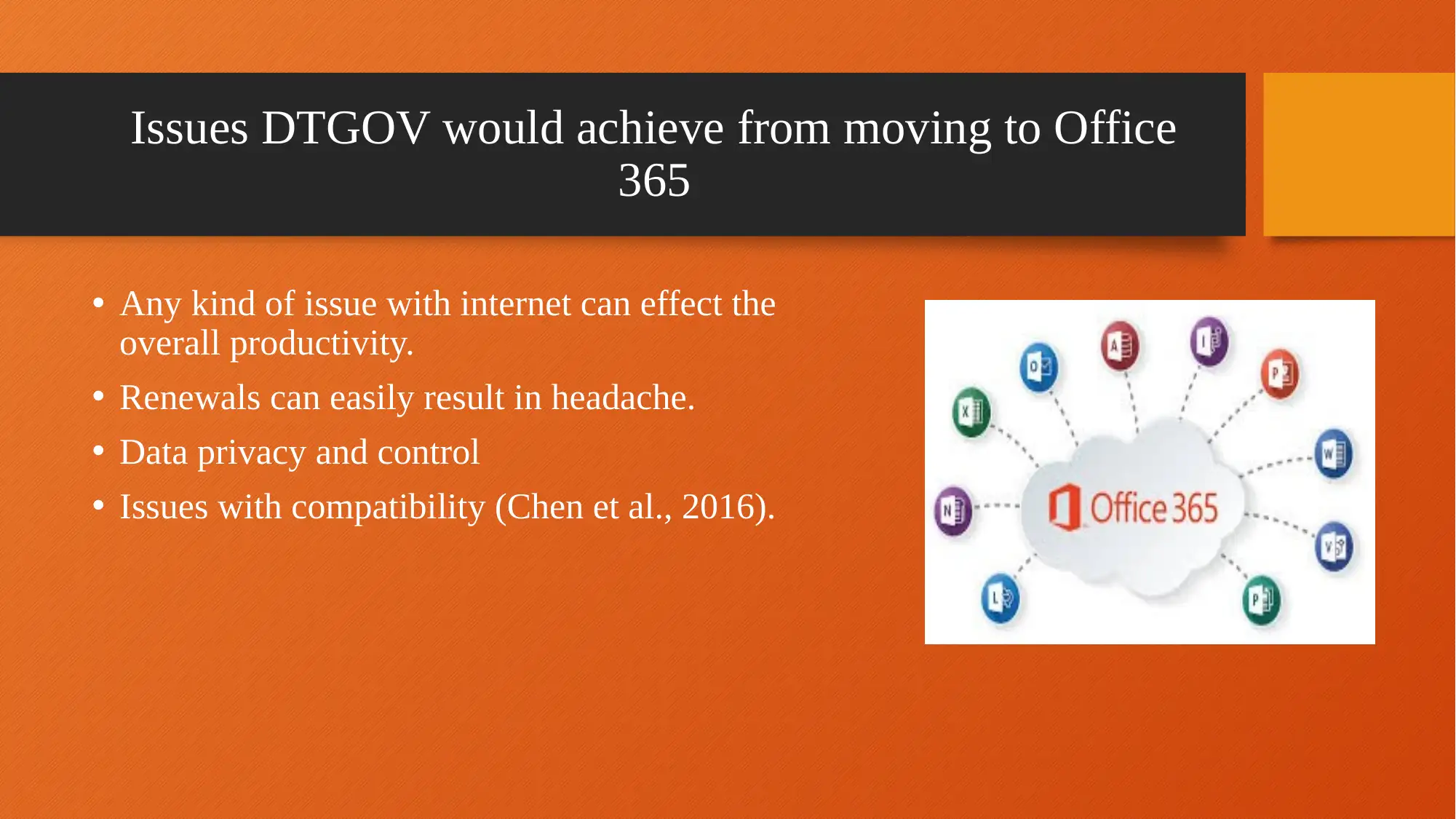
Issues DTGOV would achieve from moving to Office
365
• Any kind of issue with internet can effect the
overall productivity.
• Renewals can easily result in headache.
• Data privacy and control
• Issues with compatibility (Chen et al., 2016).
365
• Any kind of issue with internet can effect the
overall productivity.
• Renewals can easily result in headache.
• Data privacy and control
• Issues with compatibility (Chen et al., 2016).
Secure Best Marks with AI Grader
Need help grading? Try our AI Grader for instant feedback on your assignments.
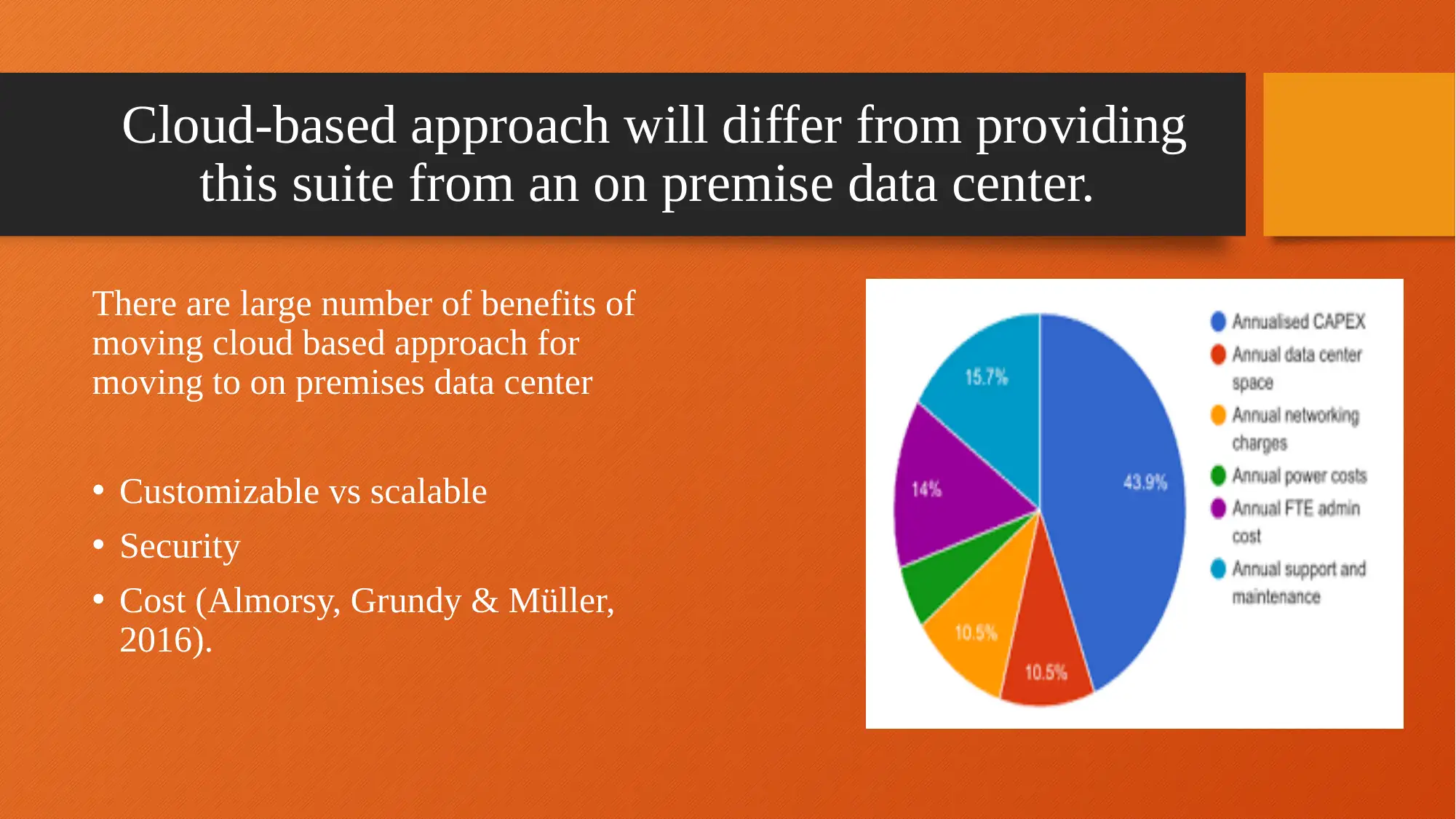
Cloud-based approach will differ from providing
this suite from an on premise data center.
There are large number of benefits of
moving cloud based approach for
moving to on premises data center
• Customizable vs scalable
• Security
• Cost (Almorsy, Grundy & Müller,
2016).
this suite from an on premise data center.
There are large number of benefits of
moving cloud based approach for
moving to on premises data center
• Customizable vs scalable
• Security
• Cost (Almorsy, Grundy & Müller,
2016).
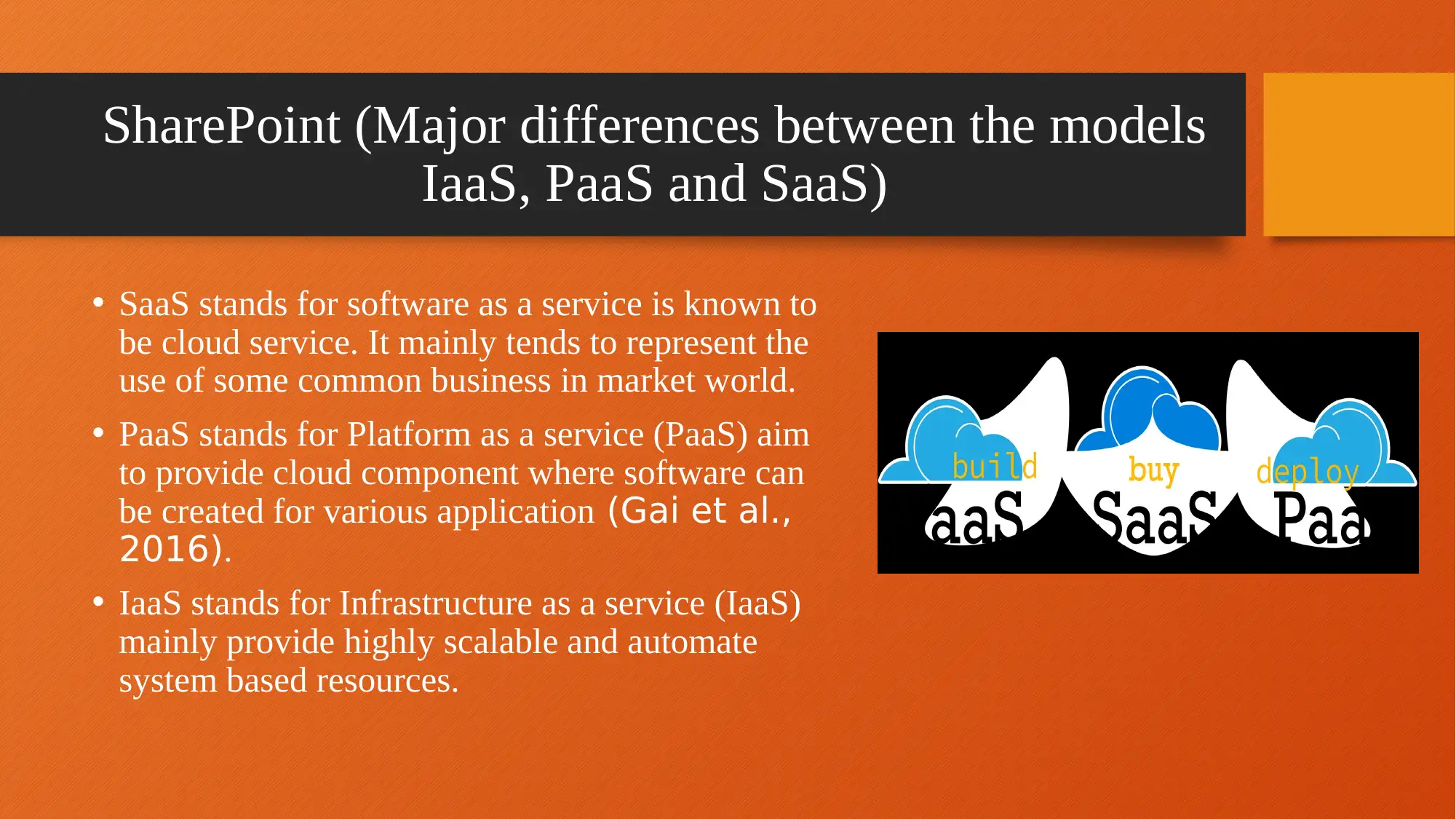
SharePoint (Major differences between the models
IaaS, PaaS and SaaS)
• SaaS stands for software as a service is known to
be cloud service. It mainly tends to represent the
use of some common business in market world.
• PaaS stands for Platform as a service (PaaS) aim
to provide cloud component where software can
be created for various application (Gai et al.,
2016).
• IaaS stands for Infrastructure as a service (IaaS)
mainly provide highly scalable and automate
system based resources.
IaaS, PaaS and SaaS)
• SaaS stands for software as a service is known to
be cloud service. It mainly tends to represent the
use of some common business in market world.
• PaaS stands for Platform as a service (PaaS) aim
to provide cloud component where software can
be created for various application (Gai et al.,
2016).
• IaaS stands for Infrastructure as a service (IaaS)
mainly provide highly scalable and automate
system based resources.
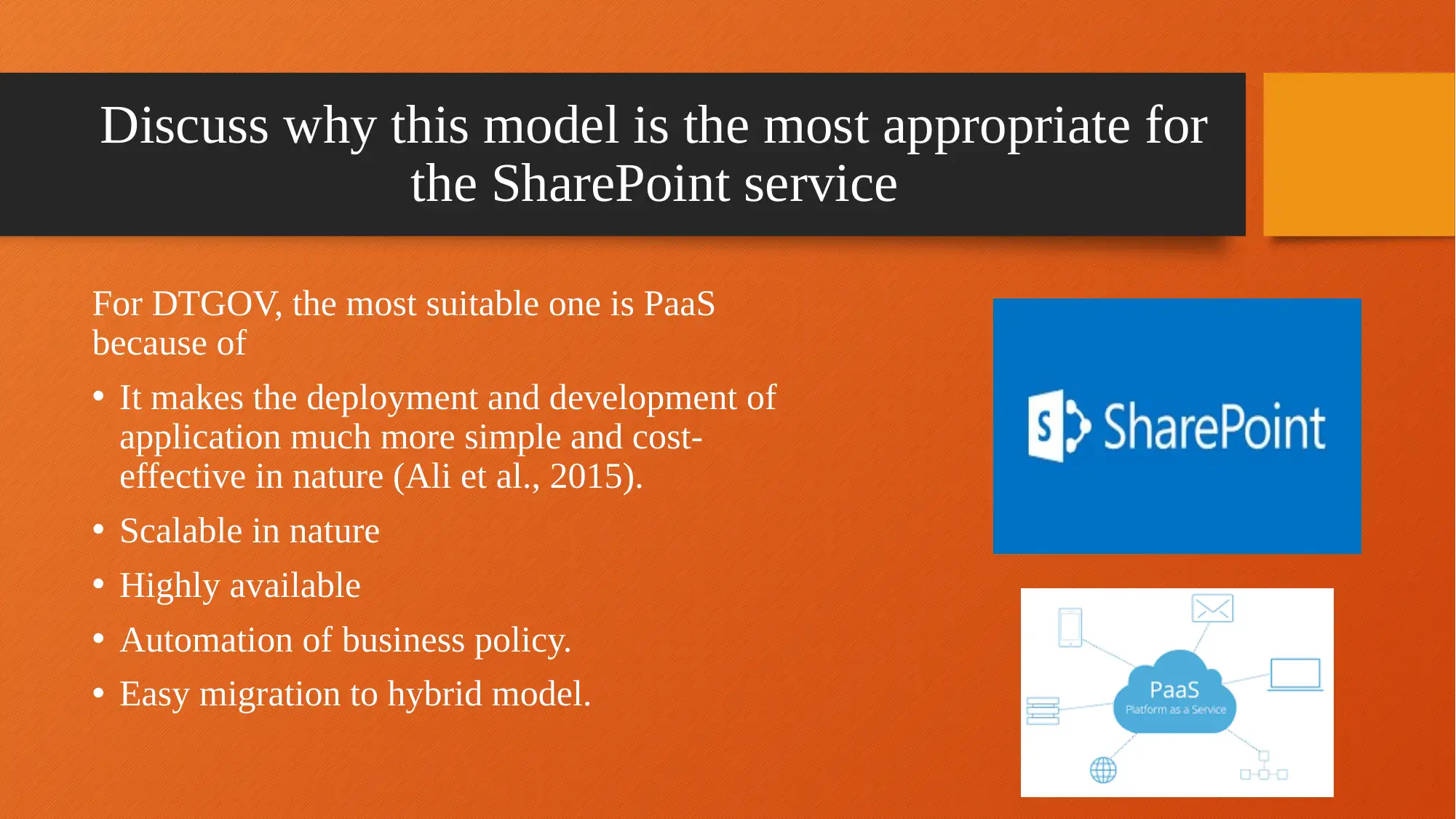
Discuss why this model is the most appropriate for
the SharePoint service
For DTGOV, the most suitable one is PaaS
because of
• It makes the deployment and development of
application much more simple and cost-
effective in nature (Ali et al., 2015).
• Scalable in nature
• Highly available
• Automation of business policy.
• Easy migration to hybrid model.
the SharePoint service
For DTGOV, the most suitable one is PaaS
because of
• It makes the deployment and development of
application much more simple and cost-
effective in nature (Ali et al., 2015).
• Scalable in nature
• Highly available
• Automation of business policy.
• Easy migration to hybrid model.
Paraphrase This Document
Need a fresh take? Get an instant paraphrase of this document with our AI Paraphraser
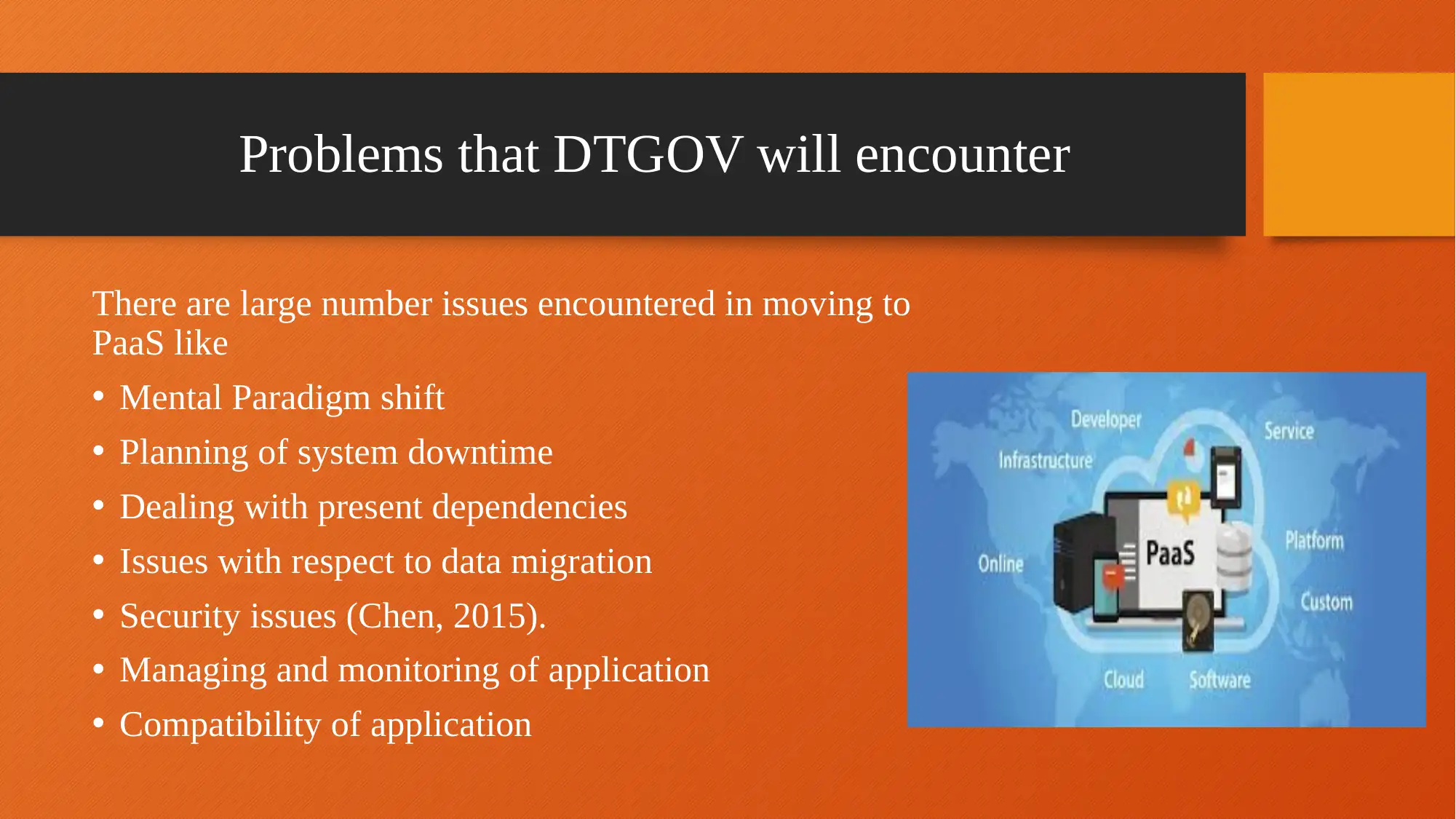
Problems that DTGOV will encounter
There are large number issues encountered in moving to
PaaS like
• Mental Paradigm shift
• Planning of system downtime
• Dealing with present dependencies
• Issues with respect to data migration
• Security issues (Chen, 2015).
• Managing and monitoring of application
• Compatibility of application
There are large number issues encountered in moving to
PaaS like
• Mental Paradigm shift
• Planning of system downtime
• Dealing with present dependencies
• Issues with respect to data migration
• Security issues (Chen, 2015).
• Managing and monitoring of application
• Compatibility of application
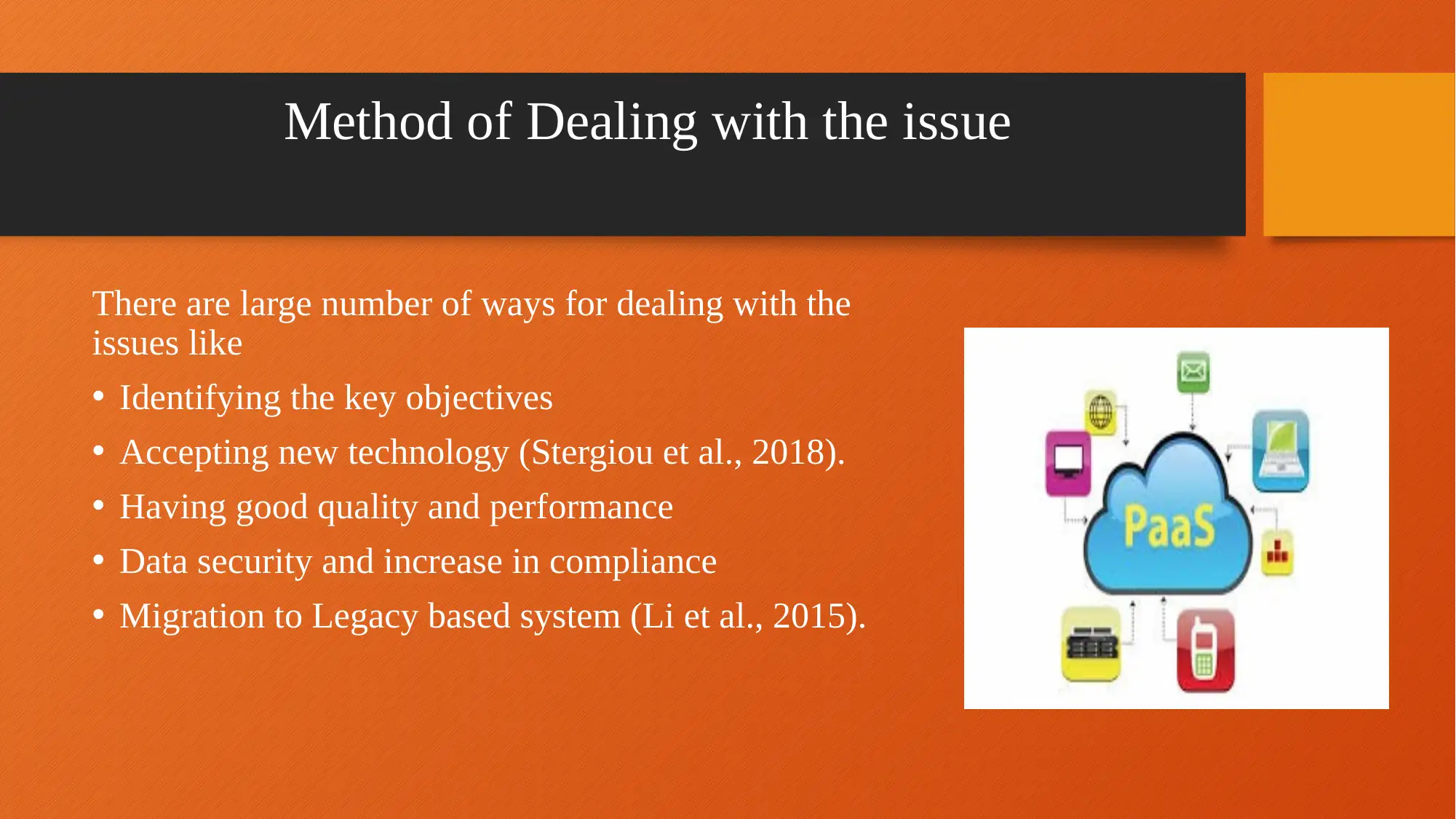
Method of Dealing with the issue
There are large number of ways for dealing with the
issues like
• Identifying the key objectives
• Accepting new technology (Stergiou et al., 2018).
• Having good quality and performance
• Data security and increase in compliance
• Migration to Legacy based system (Li et al., 2015).
There are large number of ways for dealing with the
issues like
• Identifying the key objectives
• Accepting new technology (Stergiou et al., 2018).
• Having good quality and performance
• Data security and increase in compliance
• Migration to Legacy based system (Li et al., 2015).
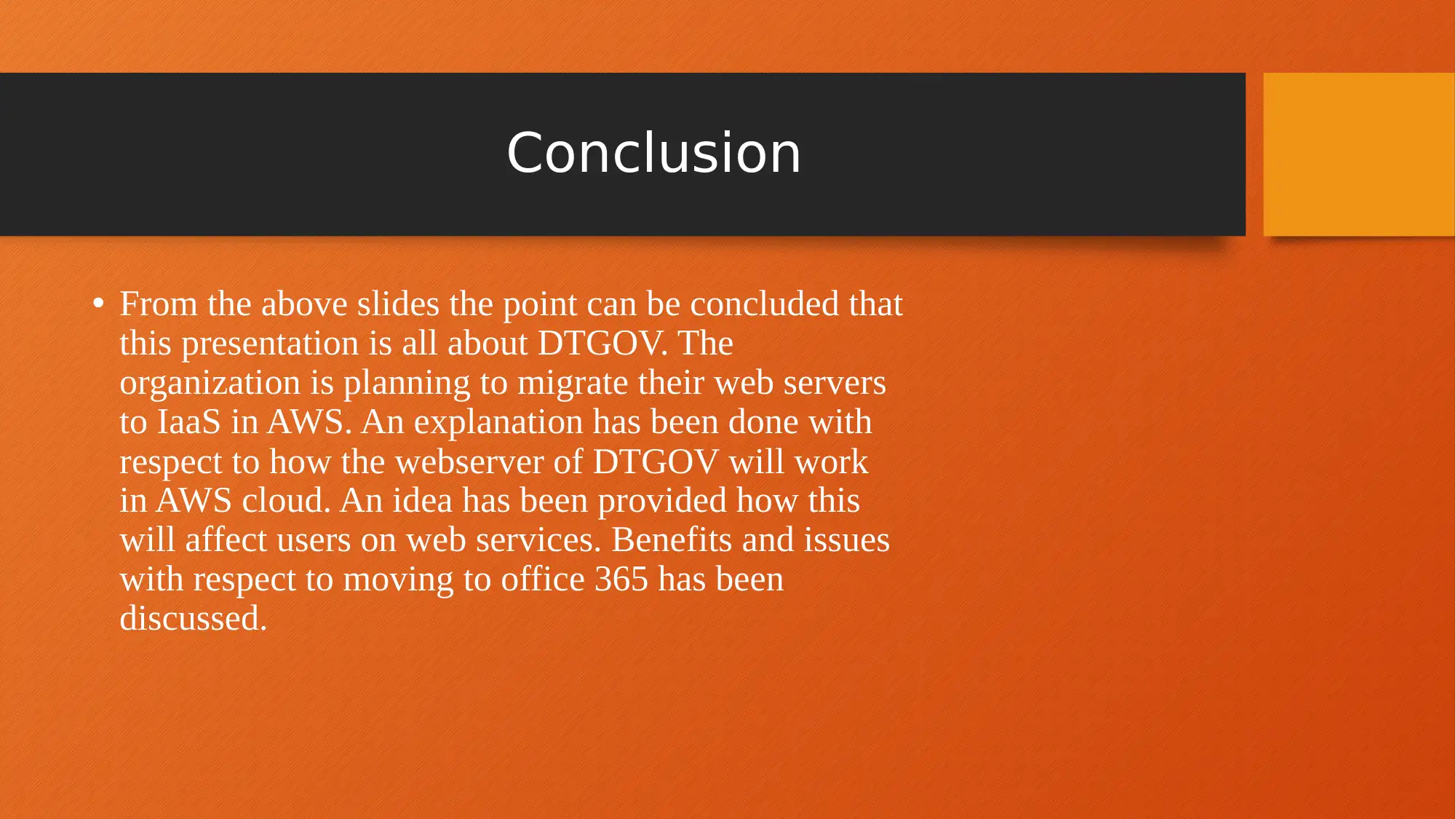
Conclusion
• From the above slides the point can be concluded that
this presentation is all about DTGOV. The
organization is planning to migrate their web servers
to IaaS in AWS. An explanation has been done with
respect to how the webserver of DTGOV will work
in AWS cloud. An idea has been provided how this
will affect users on web services. Benefits and issues
with respect to moving to office 365 has been
discussed.
• From the above slides the point can be concluded that
this presentation is all about DTGOV. The
organization is planning to migrate their web servers
to IaaS in AWS. An explanation has been done with
respect to how the webserver of DTGOV will work
in AWS cloud. An idea has been provided how this
will affect users on web services. Benefits and issues
with respect to moving to office 365 has been
discussed.
Secure Best Marks with AI Grader
Need help grading? Try our AI Grader for instant feedback on your assignments.
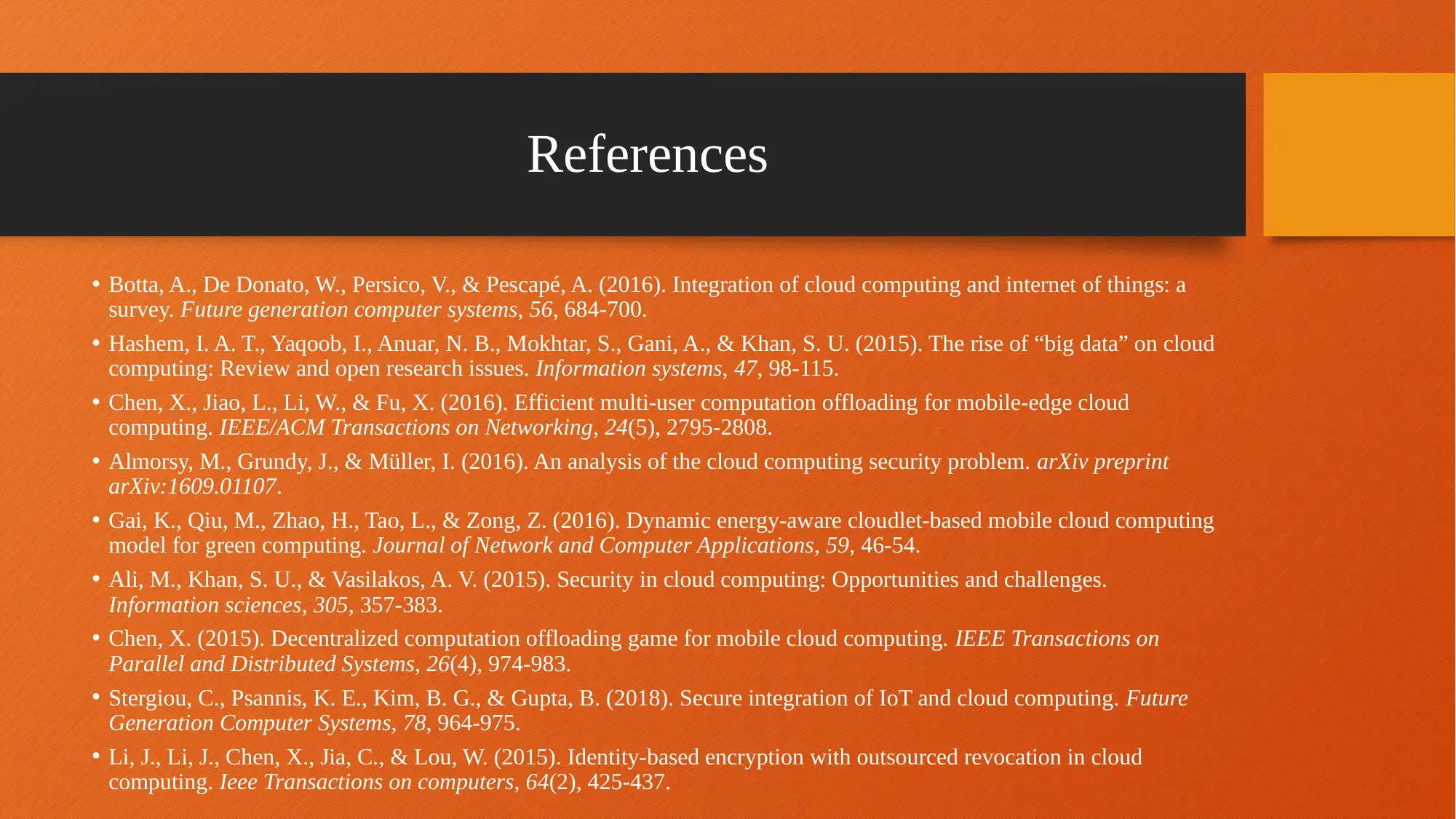
References
• Botta, A., De Donato, W., Persico, V., & Pescapé, A. (2016). Integration of cloud computing and internet of things: a
survey. Future generation computer systems, 56, 684-700.
• Hashem, I. A. T., Yaqoob, I., Anuar, N. B., Mokhtar, S., Gani, A., & Khan, S. U. (2015). The rise of “big data” on cloud
computing: Review and open research issues. Information systems, 47, 98-115.
• Chen, X., Jiao, L., Li, W., & Fu, X. (2016). Efficient multi-user computation offloading for mobile-edge cloud
computing. IEEE/ACM Transactions on Networking, 24(5), 2795-2808.
• Almorsy, M., Grundy, J., & Müller, I. (2016). An analysis of the cloud computing security problem. arXiv preprint
arXiv:1609.01107.
• Gai, K., Qiu, M., Zhao, H., Tao, L., & Zong, Z. (2016). Dynamic energy-aware cloudlet-based mobile cloud computing
model for green computing. Journal of Network and Computer Applications, 59, 46-54.
• Ali, M., Khan, S. U., & Vasilakos, A. V. (2015). Security in cloud computing: Opportunities and challenges.
Information sciences, 305, 357-383.
• Chen, X. (2015). Decentralized computation offloading game for mobile cloud computing. IEEE Transactions on
Parallel and Distributed Systems, 26(4), 974-983.
• Stergiou, C., Psannis, K. E., Kim, B. G., & Gupta, B. (2018). Secure integration of IoT and cloud computing. Future
Generation Computer Systems, 78, 964-975.
• Li, J., Li, J., Chen, X., Jia, C., & Lou, W. (2015). Identity-based encryption with outsourced revocation in cloud
computing. Ieee Transactions on computers, 64(2), 425-437.
• Botta, A., De Donato, W., Persico, V., & Pescapé, A. (2016). Integration of cloud computing and internet of things: a
survey. Future generation computer systems, 56, 684-700.
• Hashem, I. A. T., Yaqoob, I., Anuar, N. B., Mokhtar, S., Gani, A., & Khan, S. U. (2015). The rise of “big data” on cloud
computing: Review and open research issues. Information systems, 47, 98-115.
• Chen, X., Jiao, L., Li, W., & Fu, X. (2016). Efficient multi-user computation offloading for mobile-edge cloud
computing. IEEE/ACM Transactions on Networking, 24(5), 2795-2808.
• Almorsy, M., Grundy, J., & Müller, I. (2016). An analysis of the cloud computing security problem. arXiv preprint
arXiv:1609.01107.
• Gai, K., Qiu, M., Zhao, H., Tao, L., & Zong, Z. (2016). Dynamic energy-aware cloudlet-based mobile cloud computing
model for green computing. Journal of Network and Computer Applications, 59, 46-54.
• Ali, M., Khan, S. U., & Vasilakos, A. V. (2015). Security in cloud computing: Opportunities and challenges.
Information sciences, 305, 357-383.
• Chen, X. (2015). Decentralized computation offloading game for mobile cloud computing. IEEE Transactions on
Parallel and Distributed Systems, 26(4), 974-983.
• Stergiou, C., Psannis, K. E., Kim, B. G., & Gupta, B. (2018). Secure integration of IoT and cloud computing. Future
Generation Computer Systems, 78, 964-975.
• Li, J., Li, J., Chen, X., Jia, C., & Lou, W. (2015). Identity-based encryption with outsourced revocation in cloud
computing. Ieee Transactions on computers, 64(2), 425-437.
1 out of 17
Related Documents
Your All-in-One AI-Powered Toolkit for Academic Success.
+13062052269
info@desklib.com
Available 24*7 on WhatsApp / Email
![[object Object]](/_next/static/media/star-bottom.7253800d.svg)
Unlock your academic potential
© 2024 | Zucol Services PVT LTD | All rights reserved.





